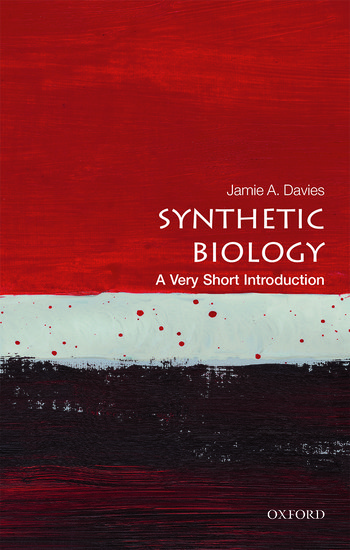Home >
A Very Short Introduction >
Synthetic Biology (Science)
A Very Short Introduction | Science
Synthetic Biology
ISBN: 9780198803492
Series: A Very Short Introduction
Synthetic Biology (Science)
A Very Short Introduction Synthetic Biology (Science) Media > Books > Non-Fiction > Education Books Expect Delays of Up to 4 Weeks| Order Below |
ISBN
9780198803492 (10-digit ISBN: 0198803494)
- Description
- Key Features
- Series Description
- Table of Contents
- Introduces the exciting new and rapidly growing field of synthetic biology
- Discusses some of its applications, such as tackling pollution and developing new drugs
- Explores the possibility of creating new life from non-living starting materials
- Considers the risks and core ethical implications of synthetic biology
Synthetic biology is one of the 21st century's fastest growing fields of research, as important for technology as for basic science. Building on traditional genetic engineering, which was restricted to changing one or two genes, synthetic biology uses multi-gene modules and pathways to make very significant changes to what cells can do. Synthetic biologists aim to have an impact in fields as diverse as drug manufacture, biofuel production, tackling pollution, and medical diagnostics. Further ahead, synthetic biology may even make possible the long-standing goal of creating new life from non-living starting materials.This Very Short Introduction provides a concise explanation of what synthetic biology is, and how it is beginning to affect many fields of technology. Jamie Davies also discusses the considerable controversies surrounding synthetic biology, from questions over the assumption that engineering concepts can be applied to living systems easily, to scepticism over the claims for commercial promise, fears that the dangers of engineering life are worse than its benefits, and concerns over whether humans should be designing living systems at all.
Oxford's Very Short Introductions series offers concise and original introductions to a wide range of subjects--from Islam to Sociology, Politics to Classics, Literary Theory to History, and Archaeology to the Bible.
Not simply a textbook of definitions, each volume in this series provides trenchant and provocative--yet always balanced and complete--discussions of the central issues in a given discipline or field. Every Very Short Introduction gives a readable evolution of the subject in question, demonstrating how the subject has developed and how it has influenced society. Eventually, the series will encompass every major academic discipline, offering all students an accessible and abundant reference library.
Whatever the area of study that one deems important or appealing, whatever the topic that fascinates the general reader, the Very Short Introductions series has a handy and affordable guide that will likely prove indispensable.
Please note: As this series is not ELT material, these titles are not subject to discount.
Preface
1: Biology: from analysis to synthesis
2: How synthetic biology is done
3: Synthetic biology and the environment
4: Synthetic biology and healthcare
5: Synthetic biology for engineering
6: Synthetic biology for basic research
7: Creating life
8: Cultural impact
Further reading
Index
Synthetic biology is one of the 21st century's fastest growing fields of research, as important for technology as for basic science. Building on traditional genetic engineering, which was restricted to changing one or two genes, synthetic biology uses multi-gene modules and pathways to make very significant changes to what cells can do. Synthetic biologists aim to have an impact in fields as diverse as drug manufacture, biofuel production, tackling pollution, and medical diagnostics. Further ahead, synthetic biology may even make possible the long-standing goal of creating new life from non-living starting materials.This Very Short Introduction provides a concise explanation of what synthetic biology is, and how it is beginning to affect many fields of technology. Jamie Davies also discusses the considerable controversies surrounding synthetic biology, from questions over the assumption that engineering concepts can be applied to living systems easily, to scepticism over the claims for commercial promise, fears that the dangers of engineering life are worse than its benefits, and concerns over whether humans should be designing living systems at all.
Key Features
- Introduces the exciting new and rapidly growing field of synthetic biology
- Discusses some of its applications, such as tackling pollution and developing new drugs
- Explores the possibility of creating new life from non-living starting materials
- Considers the risks and core ethical implications of synthetic biology
Series Description
Oxford's Very Short Introductions series offers concise and original introductions to a wide range of subjects--from Islam to Sociology, Politics to Classics, Literary Theory to History, and Archaeology to the Bible.
Not simply a textbook of definitions, each volume in this series provides trenchant and provocative--yet always balanced and complete--discussions of the central issues in a given discipline or field. Every Very Short Introduction gives a readable evolution of the subject in question, demonstrating how the subject has developed and how it has influenced society. Eventually, the series will encompass every major academic discipline, offering all students an accessible and abundant reference library.
Whatever the area of study that one deems important or appealing, whatever the topic that fascinates the general reader, the Very Short Introductions series has a handy and affordable guide that will likely prove indispensable.
Please note: As this series is not ELT material, these titles are not subject to discount.
EASY ORDER FORM
PRICES LISTED INCLUDE CONSUMPTION TAX
Price Before Tax:
¥1,790


